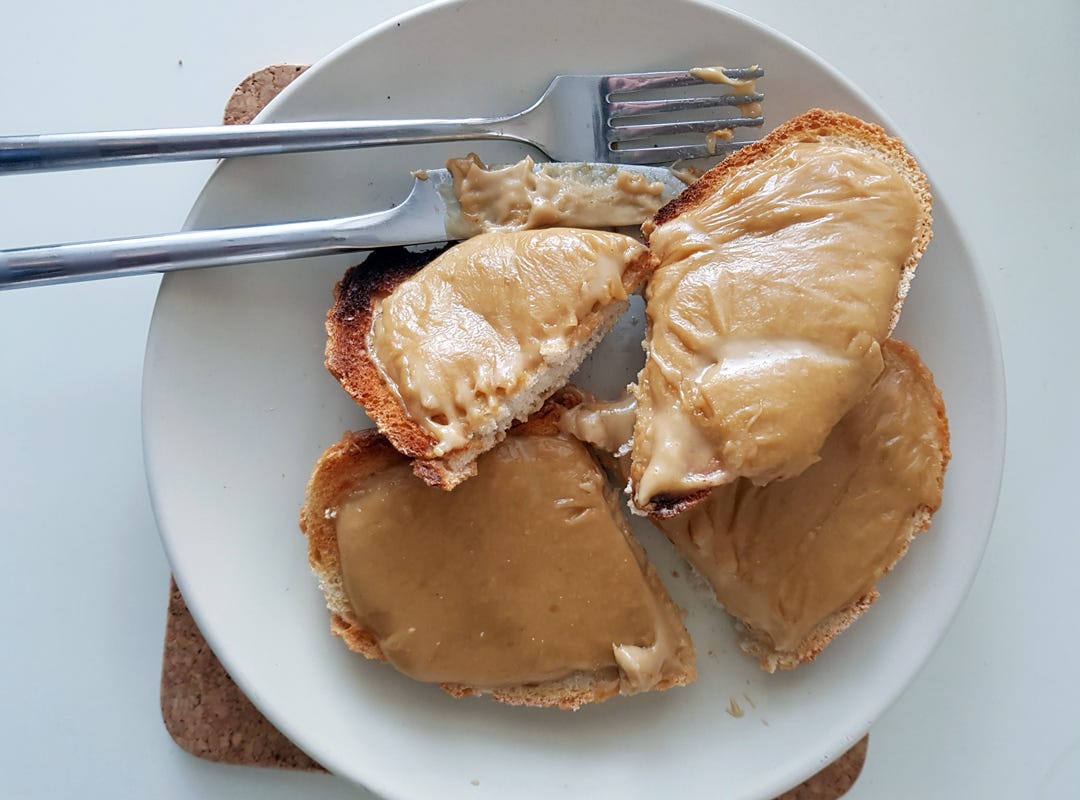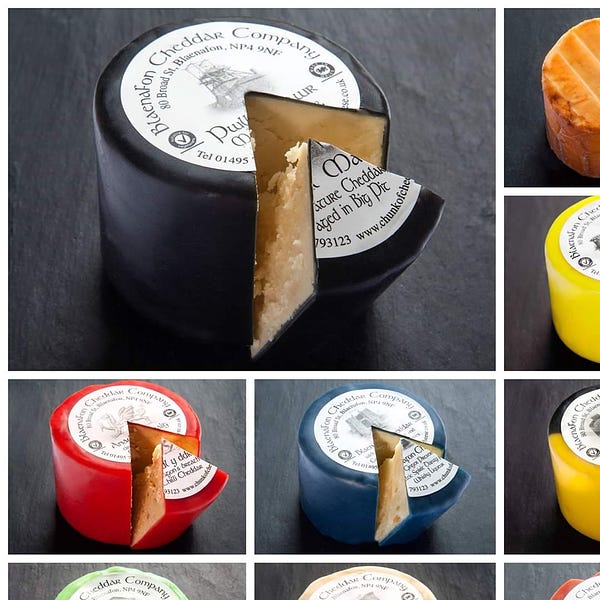I’ll start with a confession this week – although please keep reading after I say it. I’ve never been a big cheese lover. However, I have come to appreciate it over the years, whether that’s the wonderful nuttiness of a triangle of Manchego or the veiny sour punch of some crumbled Stilton. I guess it’s one of those things that you develop a taste for, such as red wine (big tick on that one) and olives. I’m a fan of continental cheeses, but for me, there’s something so diverse and joyful about British cheeses.
Back at the start of Lockdown One, I read a piece by the fantastic food writer Jenny Linford about the plight of artisan cheese makers and cheesemongers in the UK. With the closure of so many restaurants and hospitality venues, lots of small producers lost their customers overnight in what Jenny deemed the ‘British Cheese Crisis’. It got me thinking about small producers and how things must so precarious for them in the current situation. Other than beer, I think cheese is one of the only food industries to still be hugely artisanal. But then perhaps that comes from the fact the we ‘do’ cheese so well in this county and cheese making goes back a long time in Welsh gastronomy and industry.
Thanks to the successful rearing of cattle in Wales, there has always been a plentiful supply of milk from sheep, goats and cows, and with it, dairy products including butter and cheese. Often made at the hafod and served on oatcakes made at the hendre, cheese has been one of the staples of the Welsh diet. It’s perhaps one of the reasons that one of our most famous dishes is quite simply: cheese on toast.
Caws pobi (roasted cheese) dates back to medieval times when it would have consisted of toasting a piece of hard cheese in front of the fire until just soft before spreading it on toasted bread. Over the centuries, the recipe has developed into what we now more commonly know as Welsh rarebit (although other rarebits have existed around the UK for many centuries, too). Other ingredients have been added to the cheese including ale, which was often a classic accompaniment to caws pobi. Rarebit comes from rabbit, and while there’s no definitive answer, it’s thought that this was a poor man’s meat dish i.e. readily available cheese substituting often expensive meat.
So much is the dish associated with Wales that when the English court of Henry Tudor became so heavily populated by Welshmen (Henry was Welsh after all, being born at Pembroke Castle) – much to the dislike of many – a rather evocative story was popularised. It says that St Peter managed to trick Welshmen out of heaven (apparently they were causing too much trouble behind the pearly gates) by shouting “Cause Babe!”(Caws pobi) “Rosty’d cheese” (Roasted cheese). When all the Welshmen ran outside to get their cheese on toast, St Peter supposedly closed the gates behind them, locking them out. A bit harsh I think, although I’m sure they made the most of it and gave Gabriel and his choir of angels a run for their money.
I suppose the moral of the story is not to keep a Welsh person from their cheese, so without further ado, you’ll find my rarebit recipe below.
The Recipe
Ross’s Welsh Rarebit
A bit like Welsh cakes, rarebit is one of those dishes that everyone and their Welsh terrier has a recipe for. Some use Caerphilly cheese, some add egg, but all essentially result in cheesy bready goodness.
One of the best I’ve ever eaten was not in fact in Wales, but rather at the Matakana Market Kitchen, a small bistro in the village of Matakana on New Zealand’s North Island. My friend’s mum – my host – and I sat next to the river and drank local sparkling wine and dined on fabulous Welsh rarebit served with bacon and piccalilli.
Ingredients (makes plenty enough for two – plus extra topping)
25g butter
25g plain flour (although self raising if fine if it’s all you’ve got in the cupboard)
2 tsp Colman’s Mustard powder (or add a teaspoon of mustard from a jar)
2 tbsp Worcestershire sauce
125ml stout (although any beer or cider will do – or milk if you don’t want to use the alcohol)
125g mature Cheddar cheese, grated
2-4 rounds crusty bread (I like sourdough as it’s a bit more robust)
Method
In a medium-sized saucepan, melt the butter on a moderate-high heat until just fizzing, then tip in the flour and mustard powder (if you’re using mustard from a jar, add it during the next step) and whisk together to form a paste.
Turn down the heat to medium/low and bit-by-bit, add the stout and Worcestershire sauce to form a thick mixture.
Tip in the grated Cheddar and mix well until melted in. Leave to cool a little and thicken slightly.
Lightly toast the bread and place on a baking sheet. Dollop generous helpings of the rarebit topping on top.
Place under a hot grill until bubbling. Serve with a good strong cuppa or the rest of the stout! Try topping your rarebit toast with thinly sliced apple or pear for an extra treat. Or add a poached egg to make buck rarebit.
Rarebit topping is one of my rescues-anything, goes-with-everything foods. I use it instead of ketchup or brown sauce on a bacon sarnie. It’s great melted as a dip with crudités, gorgeous instead of hollandaise on poached eggs, ideal for making mini rarebit canapés with Melba toast, or slathered over steak and chips.
If you try it out, don’t forget to tag any photos with #mywelshkitchen
The Playlist
To me, cooking and music go hand in hand, whether that’s singing at the top of your voice using a wooden spoon as a microphone while waiting for pasta to boil, or dancing around with the oven gloves on as the oven timer counts down. Here are this week’s ideas for your Welsh Kitchen playlist.
Two big events in the Welsh cultural calendar are taking place over the next few days: St David’s Day (our patron saint) and the Wales versus England Six Nations rugby match. With this is mind, the first track this week is the voice of Welsh Rugby (no, not sorry Eddie Butler or Jonathan Davies) Max Boyce with his famous song about heading to Twickenham for the match. The second is perhaps the most patriotic of songs from Catatonia, which features the line, “Everyday, when I wake up, I thank the lord I’m Welsh”.
And if you are looking to fill an evening in lockdown, catch up on Côr Y Boro’s recent Noson Lawen (evening of variety entertainment) – you might even catch a glimpse of yours truly!
Hymns and Arias by Max Boyce
International Velvet by Catatonia
The Pantry
Good food is nothing without good ingredients and thankfully there are plenty of fantastic Welsh products on the market. Here is where you’ll find recommendations to stock up your cupboard, fridge or fruit bowl.
Pwll Mawr Cheddar
I put a little question out on Twitter this week for people to tell me the best Welsh cheeses and cheese makers around. It was a delight to see so many different suggestions. Many mentioned Black Bomber, which I featured in the very first newsletter, while others said Perl Wen, Caws Y Fenni, Angiddy, Caws Teifi, Pant Mawr and this one, Pwll Mawr by Blaenavon Cheddar Company. It’s a fantastic rich mature cheddar that’s aged 300ft below ground at the bottom of the Big Pit mineshaft (incidentally, one of my favourite museums).
Finally, to end this week’s newsletter, here’s a lovely little video from Dragon Dairy celebrating Welsh cheese and St David’s Day.






